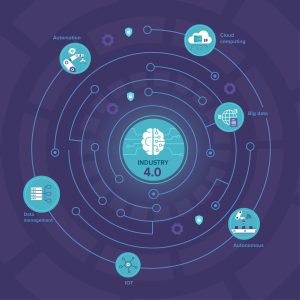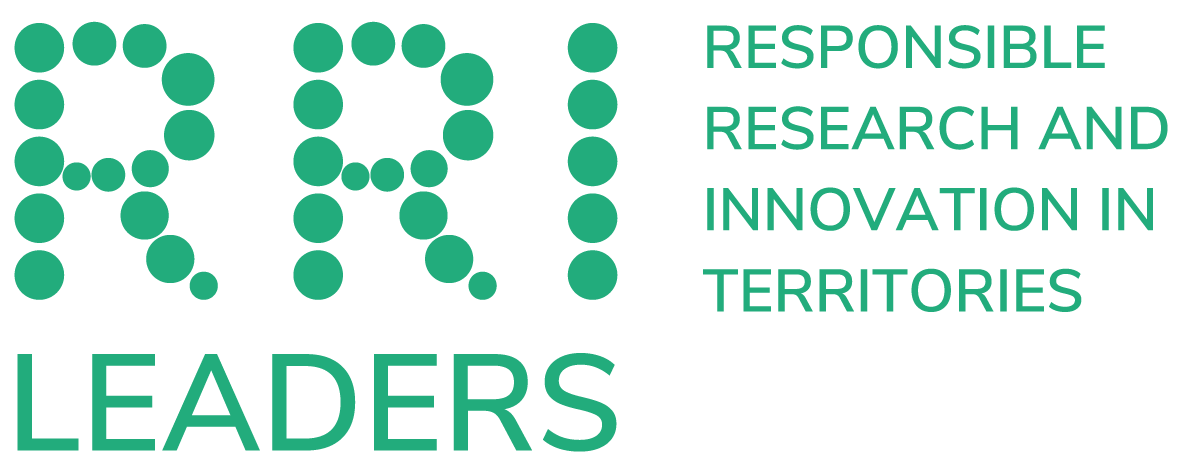Embracing RRI in Industry 4.0: Enriching research and policy development


The fourth industrial revolution, commonly known as Industry 4.0, is transforming the global economic landscape through the integration of advanced technologies such as artificial intelligence, robotics, the Internet of Things, and big data analytics. It , has brought about tremendous changes in the way we work and live. As this revolution unfolds, it becomes essential to consider the ethical, societal, and environmental implications of the innovations being developed. This is where Responsible Research and Innovation (RRI) comes into play. In this article, we will explore the implications and best practices of RRI in the early stages of research and development in Industry 4.0 projects, highlighting how it can assist policy makers in their crucial work.
Understanding RRI in the Context of Industry 4.0.
RRI is an approach that aims to align scientific and technological advancements with societal needs and values. It is a concept developed by the European Commission that aims to ensure that research and innovation activities are carried out in a way that takes into account the ethical, social, and environmental impacts of technology. It aims to promote transparency, inclusiveness, and anticipation in research and innovation processes. It emphasizes inclusivity, public engagement, ethics, gender equality, sustainability, and open access to knowledge. Integrating RRI principles in Industry 4.0 projects from the early stages helps ensure that the outcomes are not only technically proficient but also considerate of social and environmental impacts.
How can the RRI framework be applied in Industry 4.0 projects?
In the early stages of research and development, the RRI framework can help guide the development of Industry 4.0 projects in a responsible and sustainable way. Here are some of the implications and best practices of RRI in Industry 4.0 projects:
- Anticipating Societal Needs and públic engagement: Early engagement with stakeholders, including citizens, industry representatives, and policy makers, enables researchers to gain valuable insights into the potential impacts and challenges associated with Industry 4.0 technologies. By involving these stakeholders, researchers can align their projects with societal needs, fostering greater acceptance and relevance of the outcomes, taking into account the potential impacts of technology before it is developed and reflecting on the ethical, social, and environmental implications of technology. The RRI framework emphasizes the importance of engaging the public in the research and innovation process. In the context of Industry 4.0, this means listening to the concerns and needs of the community and involving them in the decision-making process. Thus, Industry 4.0 projects can be developed in a way that takes into account the ethical and social implications of technology.
- Ethical Considerations: Industry 4.0 technologies raise ethical questions regarding privacy, data security, algorithmic bias, and job displacement. Integrating ethical considerations in the early stages of research and development allows for the identification and mitigation of potential ethical issues, leading to the responsible design and deployment of technologies.
- Sustainability and Environmental Impact: Industry 4.0 has the potential to drive sustainability by optimizing resource utilization and reducing waste. RRI encourages researchers to assess the environmental impacts of their projects and consider eco-design principles. This approach can minimize the negative consequences on the environment and foster the development of sustainable solutions.
- Gender equality. The RRI framework also emphasizes the importance of gender equality in research and innovation processes. This means ensuring that women and men have equal opportunities to participate in the development and implementation of technology. This can help ensure that Industry 4.0 projects are developed in a way that is fair and inclusive.
Best Practices for Embracing RRI in Industry 4.0 Projects:
By embracing best practices, industry stakeholders, researchers, and policy makers can navigate the complexities of Industry 4.0 while ensuring that technological advancements are aligned with societal values, ethics, and sustainability goals. Let’s take a look on someone’s:
- Collaborative and Inclusive Approach: Foster collaboration among researchers, industry stakeholders, policy makers, and societal actors throughout the research and development process. Inclusive deliberation helps generate diverse perspectives and insights, leading to better decision-making and innovation outcomes.
- Proactive Engagement: Engage with stakeholders early on to understand their concerns, aspirations, and expectations regarding Industry 4.0 technologies. This engagement can be achieved through workshops, focus groups, public consultations, and participatory design sessions. By involving stakeholders in the co-creation process, researchers can ensure that the technologies developed are user-centered and address real-world challenges.
- Ethical Review and Governance: Establish clear procedures for ethical review and governance in Industry 4.0 projects. This includes conducting ethical impact assessments, obtaining informed consent, and implementing transparent data management and privacy protection practices. Integrating ethical considerations from the outset can prevent unintended consequences and build trust in the technology.
- Gender Equality and Diversity: Promote gender equality and diversity in Industry 4.0 projects. Ensure equal opportunities for participation and representation of women, minorities, and marginalized groups. Consider the potential biases and discriminatory effects of technologies and work towards inclusive and equitable outcomes.
- Open Science and Open Access: Embrace open science principles by promoting transparency, sharing research findings, and making data, methodologies, and software openly accessible. This encourages collaboration, peer review, and scrutiny, leading to higher quality research outcomes and increased public trust in the process.
- Education and Awareness: Promote education and awareness about the ethical, social, and environmental implications of Industry 4.0 technologies among researchers, engineers, policymakers, and society at large. Provide training on responsible conduct, ethical decision-making frameworks, and tools for stakeholder engagement. Foster a culture of responsible innovation within organizations and institutions.
- Governance and Regulation: Develop appropriate governance mechanisms and regulations that address the unique challenges posed by Industry 4.0 technologies. Collaborate with policymakers, legal experts, and industry representatives to create frameworks that ensure responsible development, deployment, and use of these technologies. Regularly review and update regulations to keep pace with technological advancements.
- Sustainability and Environmental Considerations: Integrate sustainability considerations into Industry 4.0 projects. Assess the environmental impacts throughout the life cycle of technologies, including resource consumption, waste generation, and carbon emissions. Implement eco-design principles, such as energy efficiency, recyclability, and circular economy approaches, to minimize environmental footprints.
- Monitoring and Evaluation: Establish mechanisms for continuous monitoring, evaluation, and impact assessment of Industry 4.0 projects. Regularly assess the societal, economic, and environmental impacts of the technologies and policies. Adapt and adjust strategies based on the findings to ensure the desired outcomes and address emerging issues.
- Collaboration with Policy Makers: Engage with policy makers and regulatory bodies to provide insights, recommendations, and evidence-based information for policy development. Collaborate in the creation of regulations that support responsible and sustainable innovation, balancing societal benefits with ethical considerations.
Benefits of RRI for Policy Makers:
Policy makers play an important role in shaping the development of Industry 4.0 projects. The RRI framework can be a useful tool for policy makers in their daily work by helping to guide the development of policies and regulations that take into account the ethical, social, and environmental implications of technology.
- Informed Policy Development: Engaging in RRI practices provides policy makers with a deeper understanding of the implications and potential risks associated with Industry 4.0 technologies. This knowledge enables them to develop evidence-based policies that address societal concerns, promote innovation, and ensure ethical and sustainable implementation.
- Stakeholder Alignment: RRI helps policy makers establish direct connections with stakeholders, fostering dialogue and collaboration. This engagement facilitates the alignment of policy goals with societal needs, resulting in more effective and inclusive policies.
- Risk Mitigation and Responsiveness: By incorporating RRI practices, policy makers can proactively address the ethical, social, and environmental risks associated with Industry 4.0. Regular monitoring and evaluation allow for adaptive policy development, ensuring that regulations remain up-to-date and responsive to the evolving technological landscape.
Implication for RRI-LEADERS partners:
RRI-LEADERS project will explore the application and sustainability of the RRI paradigm within territorial research and innovation systems, with a special emphasis on instrumentalising territorial leadership in the design of policies that are anticipatory, inclusive, reflexive and responsive.
In this way, some partners are boosting the implementation of such principles in the development of Industry 4.0 specific strategy, such the Energy Transition and Digital Transformation.
Partners like West Macedonian Region (clean energy transition), Thalwil (energy transition) and Sofia (sustainable urban development, digital transition) push the fourth helix local community to embed RRI principles in all the R+D+I chain of related Indrustry 4.0 projects and foster ethical decision-making policies.
RRI plays a pivotal role in guiding the development and deployment of Industry 4.0 technologies. By embracing RRI in the early stages of research and development, stakeholders can collaboratively address societal concerns, foster ethical decision-making, promote sustainability, and shape policies that benefit all. Integrating RRI practices empowers researchers and policy makers to navigate the complexities of Industry 4.0 and build a future that prioritizes human well-being and sustainable technological development.
